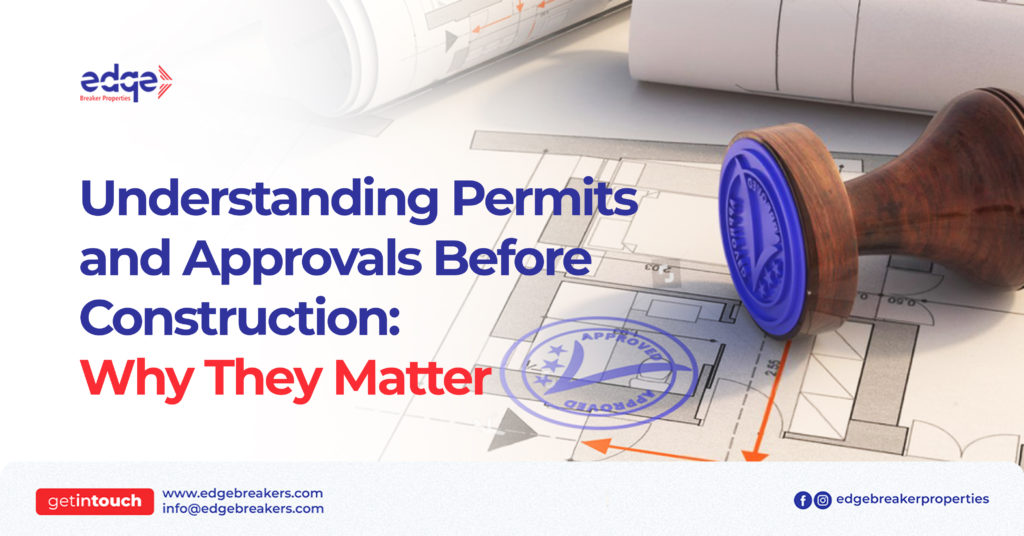Understanding Permits and Approvals Construction: Why They Matter

In the real estate industry, the excitement of starting a new project often meets a critical reality, permits and approvals. Whether it’s a private residential development or a large commercial structure, obtaining the right authorization before construction begins is not just a formality; it’s a legal and financial safeguard for all parties involved.
What Are Construction Permits and Approvals?
Permits and approvals are official authorizations issued by regulatory bodies, usually local planning authorities or development control departments, allowing an individual or organization to proceed with construction activities in compliance with existing laws, building codes, and environmental standards. They serve as an assurance that your project meets the required safety, zoning, and environmental regulations.
Key Types of Permits Required Before Construction
The specific requirements may vary depending on location, but generally, the following permits and approvals are essential:
• Land Use Approval (Title Verification):
Confirms that the proposed development aligns with the approved purpose of the land. For instance, residential projects cannot be built on land zoned for industrial use.
• Survey Plan and Layout Approval:
Ensures the property boundaries are clearly defined and the proposed building layout fits approved zoning and setback standards.
• Building Plan Approval:
Issued by the town planning authority after reviewing the architectural, structural, and engineering drawings for compliance with safety and building codes.
• Environmental Impact Assessment (EIA):
Required for major developments, this assesses how the project could affect the surrounding environment and suggests mitigation measures.
• Drainage and Infrastructure Approval:
Confirms that the project will not obstruct public utilities, drainage, or access routes.
• Development Permit / Building Permit:
The final approval that gives legal consent to commence construction.
Why Permits and Approvals Are Non-Negotiable
Ignoring proper authorization might seem like a shortcut, but the consequences can be severe:
• Legal Penalties: Unauthorized construction may attract fines, demolition orders, or litigation.
• Project Delays: Non-compliance can stall your project during inspection stages.
• Reduced Property Value: Buyers and investors avoid developments without verified permits.
• Difficulty in Financing: Banks and mortgage institutions often require approval documents before funding.
• Ultimately, proper documentation protects your investment and boosts the credibility and marketability of your project.
The Approval Process: Step-by-Step
While processes differ by region, the general workflow includes:
• Document Preparation: Secure survey plans, title documents, architectural designs, and environmental reports.
• Submission to Relevant Authority: Usually the State Ministry of Physical Planning or Urban Development.
• Site Inspection: Officials visit to verify site conditions and project details.
• Review and Compliance Checks: Technical officers evaluate the plans based on safety and zoning regulations.
• Payment of Statutory Fees: Including development levies or processing charges.
• Issuance of Approval: Once all conditions are satisfied, a building permit or approval letter is granted.
Expert Advice for Developers and Investors
Engage Professionals Early: Work with licensed architects, engineers, and town planners.
Keep Records Organized: Every document, survey, receipts, correspondence, can be vital in future transactions.
Don’t Cut Corners: Shortcuts in approval processes often cost more later.
Follow Up Regularly: Stay in contact with approval offices to monitor application progress.
Consult Local Regulations: Each state or municipality has specific laws governing construction.
Final thoughts
In real estate development, permits and approvals are the foundation of legitimacy. They safeguard not only your project but also public safety, environmental integrity, and investor confidence.
A successful project doesn’t begin with cement and bricks, it begins with compliance.
Oluwatosin Damilare
{Marketing Department}

